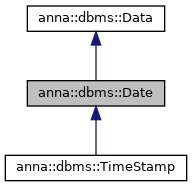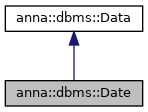#include <Date.hpp>


Public Member Functions | |
| Date (const bool isNulleable=false, const char *format=NULL) | |
| Date (const Date &other) | |
| virtual | ~Date () |
| const tm & | getValue () const |
| tm & | getValue () |
| virtual const char * | getCStringValue () const |
| Second | getSecondValue () const |
| const char * | getFormat () const |
| int | getYear () const |
| int | getMonth () const |
| int | getDay () const |
| int | getHour () const |
| int | getMinute () const |
| int | getSecond () const |
| void | setYear (const int year) noexcept(false) |
| void | setMonth (const int month) noexcept(false) |
| void | setDay (const int day) noexcept(false) |
| void | setHour (const int hour) noexcept(false) |
| void | setMinute (const int minute) noexcept(false) |
| void | setSecond (const int second) noexcept(false) |
| void | setValue (const char *str) noexcept(false) |
| void | setValue (const std::string &str) noexcept(false) |
| void | setValue (const Second &second) noexcept(false) |
| Date & | operator= (const Date &date) noexcept(false) |
| virtual std::string | asString () const |
 Public Member Functions inherited from anna::dbms::Data Public Member Functions inherited from anna::dbms::Data | |
| int | getMaxSize () const |
| Type::_v | getType () const |
| void * | getBuffer () |
| bool | isNull () const |
| bool | isNulleable () const |
| void | setNull (const bool isNull) |
| void | clear () |
Static Public Attributes | |
| static const int | MaxDateSize = 48 |
Protected Member Functions | |
| Date (const Type::_v type, const bool isNulleable, const char *format) | |
 Protected Member Functions inherited from anna::dbms::Data Protected Member Functions inherited from anna::dbms::Data | |
| Data (const Type::_v type, const int maxSize, const bool isNulleable) | |
| Data (const Data &other) | |
| void | setBuffer (void *buffer) |
Protected Attributes | |
| char * | a_format |
| tm | a_value |
| char | a_buffer [MaxDateSize+1] |
Detailed Description
Tipo de datos que permite trabajar con el tipo de dato 'Date' de un gestor de base de datos generico.
Dependiendo el gestor de base de datos usado el tipo date puede contener informacion que incluya la hora del día, en Oracle (tm) la incluye, mientras que en mysql, por ejemplo, no la incluye.
Internamente trabaja con una estructura de tipo 'tm' que habitualmente tendrá los campos:
Constructor & Destructor Documentation
◆ Date() [1/3]
|
explicit |
Constructor.
- Parameters
-
isNulleable Indica si el dato puede tomar valores nulos. format Formato usado para interpretar los datos de esta fecha, en los metodos Date::getCStringValue y Date::setValue (const char*) y Date::setValue (const std::string&). Sigue la especificacion:
Para obtener más informacion sobre la espeficacion de formato man strftime (p.e.).
◆ Date() [2/3]
| anna::dbms::Date::Date | ( | const Date & | other | ) |
Constructor copia.
- Parameters
-
other Instancia de la que copiar.
◆ ~Date()
|
virtual |
Destructor.
◆ Date() [3/3]
|
explicitprotected |
Constructor invocado desde el constructor de TimeStamp.
- Parameters
-
type Sera Data::Type::TimeStamp. isNulleable Indica si el dato puede tomar valores nulos. format Formato usado para representar los datos de esta fecha.
Member Function Documentation
◆ asString()
|
virtual |
Devuelve una cadena con la informacion referente a esta instancia.
- Returns
- Una cadena con la informacion referente a esta instancia.
Reimplemented from anna::dbms::Data.
◆ getCStringValue()
|
virtual |
Interpreta el contenido de la fecha y lo transfiere al buffer.
- Returns
- El buffer que contiene esta fecha interpretada con el formato indicado en el contructor.
- Warning
- El resultado sera NULL en caso de no poder interpretar correctamente la fecha.
Reimplemented in anna::dbms::TimeStamp.
◆ getDay()
|
inline |
Devuelve el dia del mes contenido por esta fecha.
- Returns
- El dia del mes contenido por esta fecha.
◆ getFormat()
|
inline |
Devuelve el formato indicado en el constructor de la clase.
- Returns
- El formato indicado en el constructor de la clase.
◆ getHour()
|
inline |
Devuelve la hora del dia contenida en la fecha.
- Returns
- La hora del dia contenida en la fecha.
- Warning
- Verifique que el tipo 'Date' de su RDBMS es capaz de contener horas, minutos y segundos.
◆ getMinute()
|
inline |
Devuelve el minuto de la hora contenida en la fecha.
- Returns
- El minuto de la hora contenida en la fecha.
- Warning
- Verifique que el tipo 'Date' de su RDBMS es capaz de contener horas, minutos y segundos.
◆ getMonth()
|
inline |
Devuelve el mes contenido por esta fecha.
- Returns
- El mes contenido por esta fecha.
◆ getSecond()
|
inline |
Devuelve el segundo de la hora contenida en la fecha.
- Returns
- El segundo de la hora contenida en la fecha.
- Warning
- Verifique que el tipo 'Date' de su RDBMS es capaz de contener horas, minutos y segundos.
◆ getSecondValue()
|
inline |
Interpreta el contenido de esta fecha como el numero de segundos transcurridos desde el 1 de Enero de 1970. Si el contenido de la columna sociada es nulo este metodo devolvera 0. Si la conversion a segundos no puede ser realizada devolvera -1.
- Returns
- Interpreta el contenido de esta fecha como el numero de segundos transcurridos desde el 1 de Enero de 1970. Si el contenido de la columna sociada es nulo este metodo devolvera 0. Si la conversion a segundos no puede ser realizada devolvera -1.

◆ getValue() [1/2]
|
inline |
Devuelve el contenido de esta fecha.
- Returns
- El contenido de esta fecha.
- Warning
- Si el metodo Data::isNull devolvio true el contenido de la estructura no esta definido.
◆ getValue() [2/2]
|
inline |
Devuelve el contenido de esta fecha.
- Returns
- El contenido de esta fecha.
- Warning
- Si el metodo Data::isNull devolvio true el contenido de la estructura no esta definido.

◆ getYear()
|
inline |
Devuelve el año contenido por esta fecha.
- Returns
- El año contenido por esta fecha.
◆ operator=()
Operador de copia.
- Parameters
-
date Fecha de la que copiar.
- Returns
- La instancia de esta fecha.
- Warning
- Solo copia el contenido de la fecha recibida, no cambia el formato de interpretacion de la fecha origen.
◆ setDay()
|
inlinenoexcept |
Establece el dia del mes de esta fecha.
- Parameters
-
day Dia del mes. Debe estar comprendido entre 1 y 31.
◆ setHour()
|
inlinenoexcept |
Establece la hora de esta fecha.
- Parameters
-
hour Hora del dia. Debe estar comprendida entre 0 y 23.
- Warning
- Verifique que el tipo 'Date' de su RDBMS es capaz de contener horas, minutos y segundos.
◆ setMinute()
|
inlinenoexcept |
Establece el minuto de esta fecha.
- Parameters
-
minute Minuto de la hora del dia. Debe estar comprendida entre 0 y 59.
- Warning
- Verifique que el tipo 'Date' de su RDBMS es capaz de contener horas, minutos y segundos.
◆ setMonth()
|
inlinenoexcept |
Establece mes de esta fecha.
- Parameters
-
month Mes de la fecha. Debe estar comprendido entre 1 y 12.
◆ setSecond()
|
inlinenoexcept |
Establece el segundo de esta fecha.
- Parameters
-
second Segungo de la hora del dia. Debe estar comprendida entre 0 y 60.
- Warning
- Verifique que el tipo 'Date' de su RDBMS es capaz de contener horas, minutos y segundos.

◆ setValue() [1/3]
|
noexcept |
Interpreta la cadena recibida segun el formato indicado en el constructor y la asigna a esta instancia, pero requiere que al invocar al constructor de esta fecha se indique el formato usado para traducir.
- Parameters
-
str Cadena de la que copiar.
◆ setValue() [2/3]
|
inlinenoexcept |
Interpreta la cadena recibida segun el formato indicado en el constructor y la asigna a esta instancia, pero requiere que al invocar al constructor de esta fecha se indique el formato usado para traducir.
- Parameters
-
str Cadena de la que copiar.

◆ setValue() [3/3]
|
noexcept |
Establece esta fecha con los segundos transcurridos desde el 1/1/1970.
- Parameters
-
second Numeros de segundos transcurridos desde el 1 de Enero de 1970.
- See also
- anna::functions::second
◆ setYear()
|
inlinenoexcept |
Establece el año de esta fecha
- Parameters
-
year Año de la fecha. Debe ser mayor de 1900.
Member Data Documentation
◆ a_buffer
|
protected |
◆ a_format
|
protected |
◆ a_value
|
protected |
◆ MaxDateSize
|
static |
Espacio maximo reservado para representar lo datos de una fecha sobre una cadena.
The documentation for this class was generated from the following file:
- /tmp/anna/include/anna/dbms/Date.hpp
 1.8.13
1.8.13